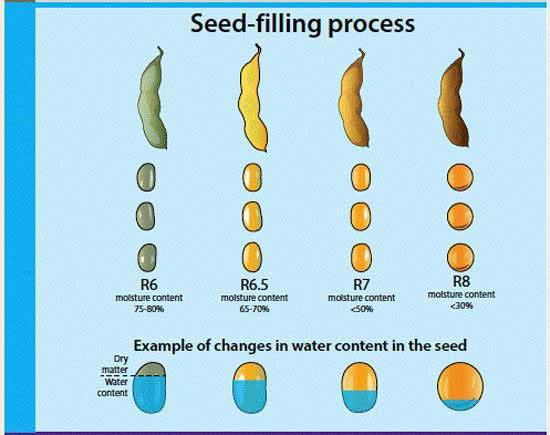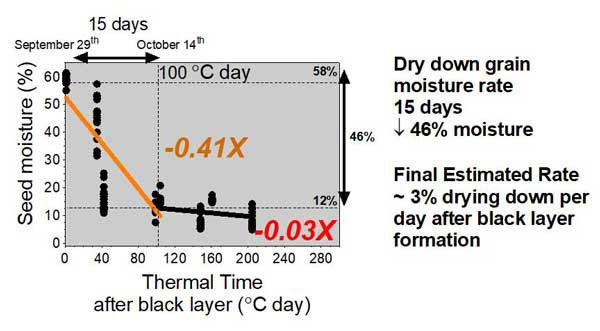The latest USDA-National Agricultural Statistics Service crop progress and condition report released September 27, 2021 classified 58% of the soybean crop to be in good or excellent condition. Overall, 57% of all soybeans in Kansas are dropping leaves, behind the 65% from last year but ahead of the five-year average of 52%.
Weather outlook
The weather conditions expected for October will be critical for soybeans as related to seed filling and determining final seed weight.
Current conditions have been much warmer than normal thus far in September. In addition, current forecast projections favor continued warmth through much of October. The future for precipitation is slightly better with the 8-14 day outlook, suggesting some possibility for near-average to slightly above average amounts. While this is needed rain, it may be too late for grain filling. Also, keep in mind that there is a significant drop in normal rainfall amounts from September to October as we move into a typically drier part of the year.
Soybean dry down
Soybeans will reach final maturity with high seed water content, moving from 90% to around 60% from beginning of seed filling until final maturity. Final maturity is defined as the formation of the black layer in the seeds. The dry down rate will depend on the maturity group (affecting the length of the season), planting date, and weather conditions experienced during the latter part of the reproductive phase.
Changes in the water content during the seed-filling process (Figure 1) were previously described in our “Soybean Growth and Development” poster. As described for corn, seed water loss for soybeans can also divided in two phases: 1) before “black layer” or maturity, and 2) after black layer. For understanding the changes in water content before “black layer”, visit the previous article in Issue 816 (August 28, 2020) related to the contribution of seed filling to yield: https://bit.ly/3jpq5Wu

Figure 1. Soybean seed filling process from full seed to full maturity. Photo and infographic prepared by Ignacio Ciampitti, K-State Research and Extension. Taken from Soybean Growth and Development, MF3339.
To address the question related to the dry down rate for soybeans, a study was conducted to investigate the changes in water content from black layer formation (maturity) until harvest time (Figure 2). During the last days of September and mid-October 2016, the overall dry down rate was around 3% per day (from 58% to 12% seed moisture) – taking an overall period of 15 days.

Figure 2. Grain moisture dry down (orange line) across three hybrids and different N rates near Manhattan, KS. Horizontal dashed lines marked the 58% seed moisture at black layer formation. * Graph prepared by Ignacio Ciampitti, K-State Research and Extension.
*Note: It is desired to reach harvest with 13% seed moisture to maximize the final seed volume to be sold, thus the importance of timing harvest with the right seed moisture content.
Soybean dry down rate was three-time faster, 3% per day, relative to corn at 1% per day. These dry down rates for corn and soybeans are primarily affected by temperature, humidity, and overall water content at the point of black layer formation (maturity). These main factors should be considered when the time comes to schedule soybean harvest.
Ignacio A. Ciampitti, Farming Systems
ciampitti@ksu.edu
Christopher “Chip” Redmond, Kanas Mesonet Manager
christopherredmond@ksu.edu